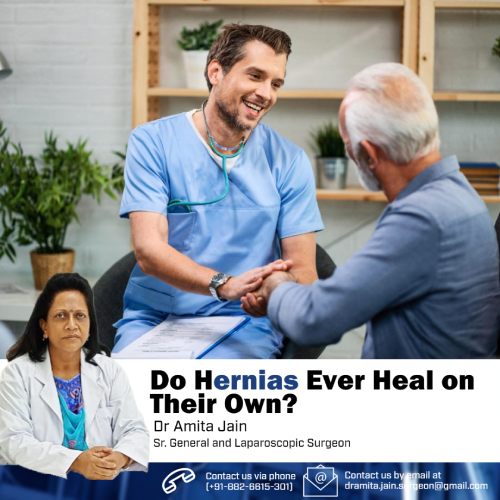Reveals India’s Top Laparoscopic Surgeon for Hernia Dr. Amita Jain
Hernias come in various forms, but they all share a common trait – they cannot resolve on their own. A hernia occurs when an organ or tissue protrudes into an area where it should not be, due to weakened or compromised support tissue.
Delhi’s leading hernia surgeon Dr. Amita Jain is well-equipped to address this issue and restore everything to its rightful place through surgical intervention. In this blog, Dr. Amita Jain shares insights on whether hernias heal on their own or not.
What are the major types of hernia?
The most prevalent types of hernias encompass various areas of the body. Here are the primary types:
- Inguinal hernias: While both men and women possess inguinal canals in their groins, men are more prone to this type due to their anatomical structure. The inguinal canal, responsible for the descent of a man’s testes before birth, contains the spermatic cord and blood vessels. Its inherent weakness allows tissue to protrude through.
- Femoral hernias: Occurring more frequently in women, femoral hernias manifest when tissue or a portion of the intestine protrudes into the groin near the upper thigh.
- Umbilical hernias: This type arises when fatty tissue or a section of the intestine pushes through the abdominal wall near the navel.
- Hiatal hernias: Hiatal hernias occur when a portion of the stomach pushes through the diaphragm, leading to this condition.
While there are other less common types of hernias, the aforementioned ones account for the majority of cases. In fact, inguinal and femoral hernias make up approximately 75% to 80% of all hernia occurrences.
Do hernias ever just go away?
The majority of hernias, with the exception of umbilical hernias in newborns, do not resolve spontaneously. In the case of adults, hernias typically do not heal on their own and have the potential to worsen over time. This highlights the importance of early intervention as a recommended approach to address hernias effectively.

Treating your hernia
Once Dr. Jain assesses your hernia, she will determine the appropriate surgical approach. In many cases, it will carefully reposition the protruding tissue and repair the weakened area with sutures. Additionally, it may reinforce the repair by placing a mesh over the site to enhance its strength.
For larger hernias, one may need to reconstruct the muscles to prevent the recurrence of the condition.
To perform these procedures, laparoscopic techniques, are utilized which involve making small incisions. This minimally invasive approach is designed to minimize risks and facilitate faster recovery for our patients.
It is important to note that most adult hernias necessitate treatment. To initiate the process, simply reach out to laparoscopic hernia surgeon Dr Amita Jain to schedule a consultation.

Dr Amita Jain is one of India’s most distinguished and experienced senior surgeons who has conducted more than 1,00,000 successful surgeries, and has covered a wide spectrum of general and minimally invasive procedures. Dr Amita Jain is refered as the pioneer surgeon in the fields of Gallbladder stone removal surgery, appendix removal surgery, hernia repair surgery, Pilonidal Sinus treatments, varicose vein and piles surgery, fistula surgery and fissure surgeries.
With an outstanding career spanning over 29 years, Dr Amita Jain has earned her place among the top General and Laparoscopic surgeons in Delhi and India, known for her precision, compassion, and consistent surgical excellence. She was the Professor of Surgery at the Army College of Medical Sciences and Base Hospital, Delhi Cantt. In 1994, she was commissioned as a surgeon under the United Nations Mission in Congo.
Dr Amita Jain currently serves as the Head of Department and Senior Consultant for General, Laparoscopic and Trauma Surgery at Artemis Lite Hospital, Rosewalk – Luxury Maternity Hospital in Delhi (Panchsheel Park, Delhi) and Rainbow Children Hospitals (Malviya Nagar, Delhi).
